Estate Planning Attorney Resume Examples

Jul 18, 2024
|
12 min read
Drafting your future: A step-by-step guide to creating a standout estate planning attorney resume that's sure to lock in job offers.
Rated by 348 people
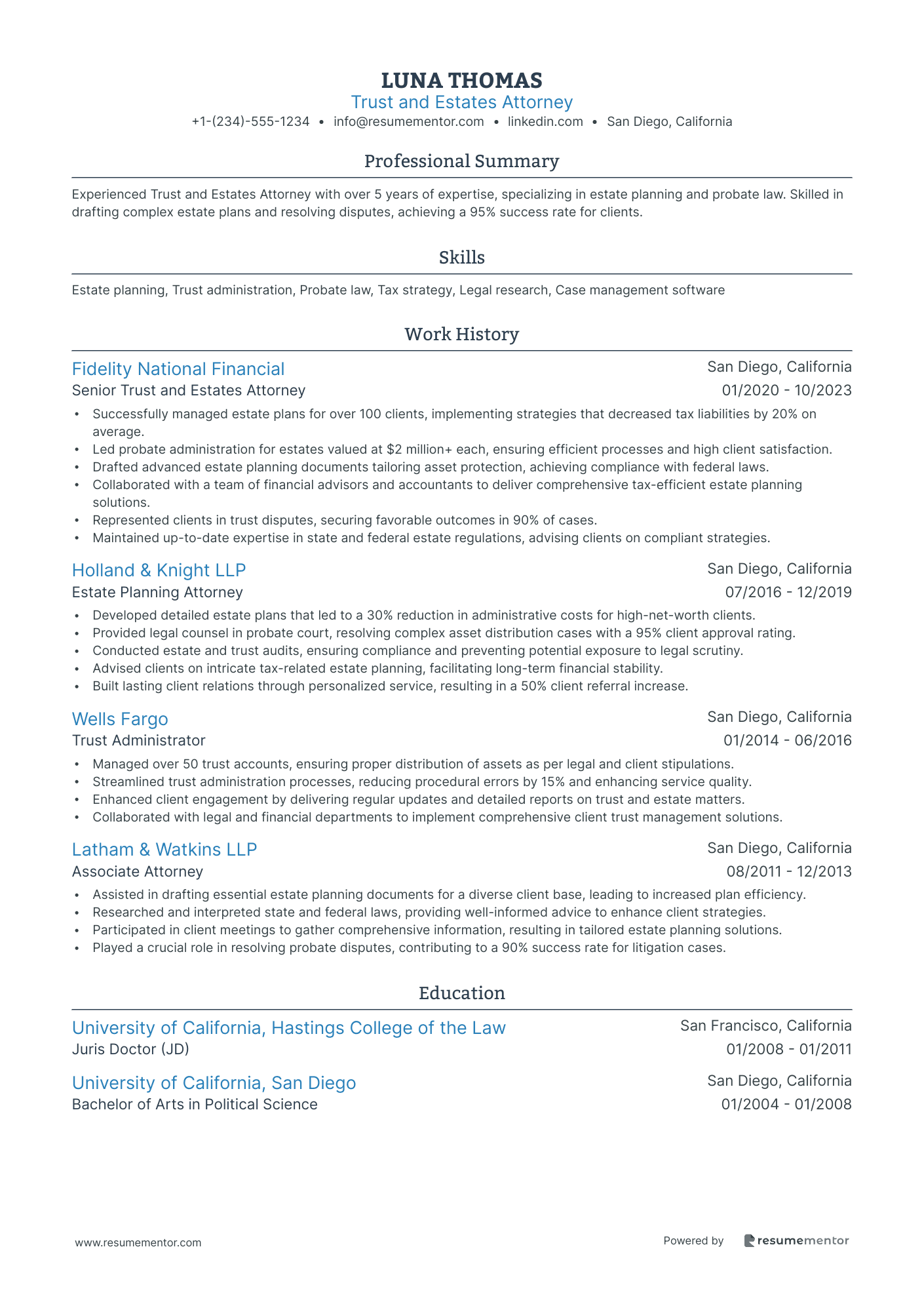
Trust and Estates Attorney
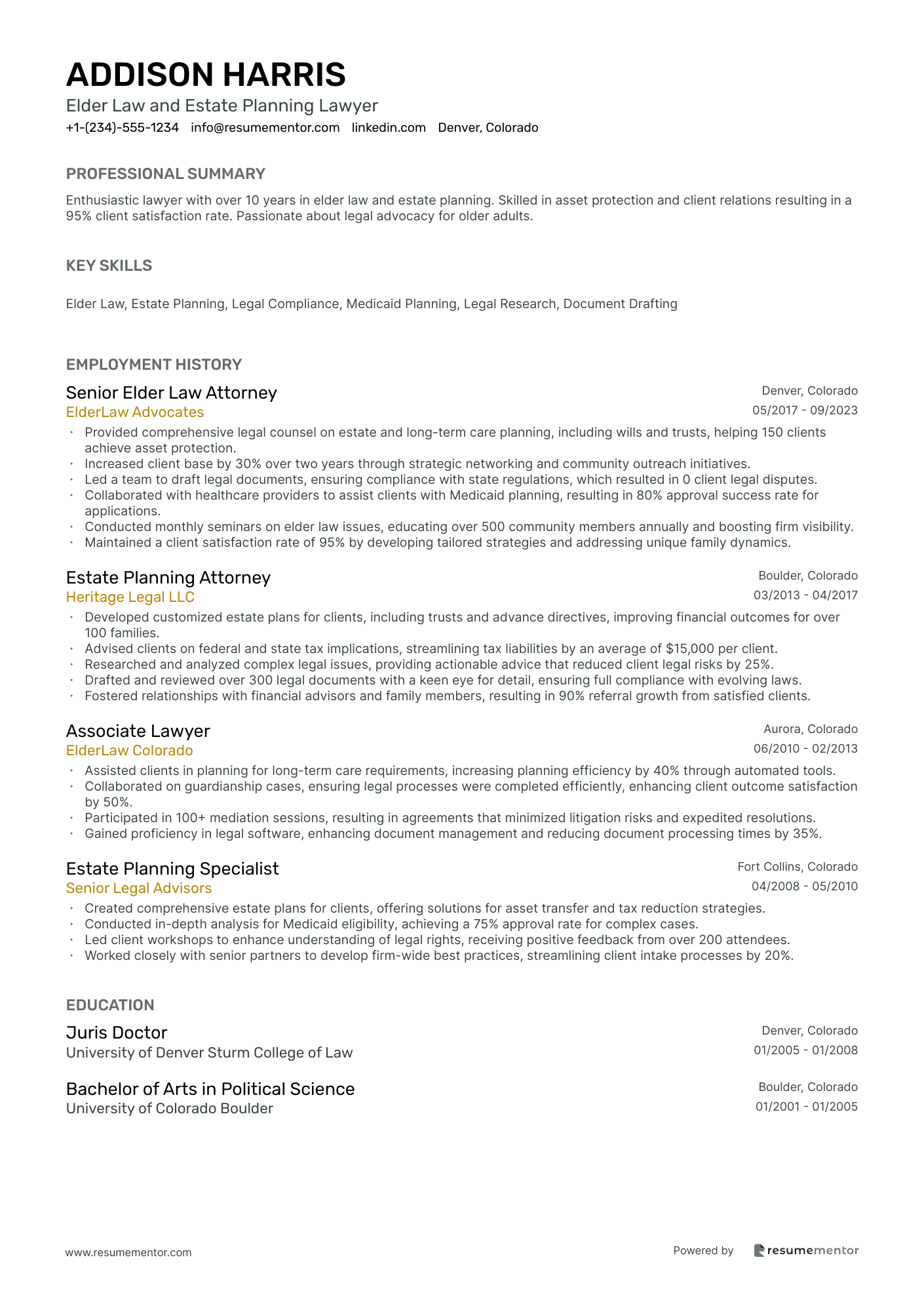
Elder Law and Estate Planning Lawyer
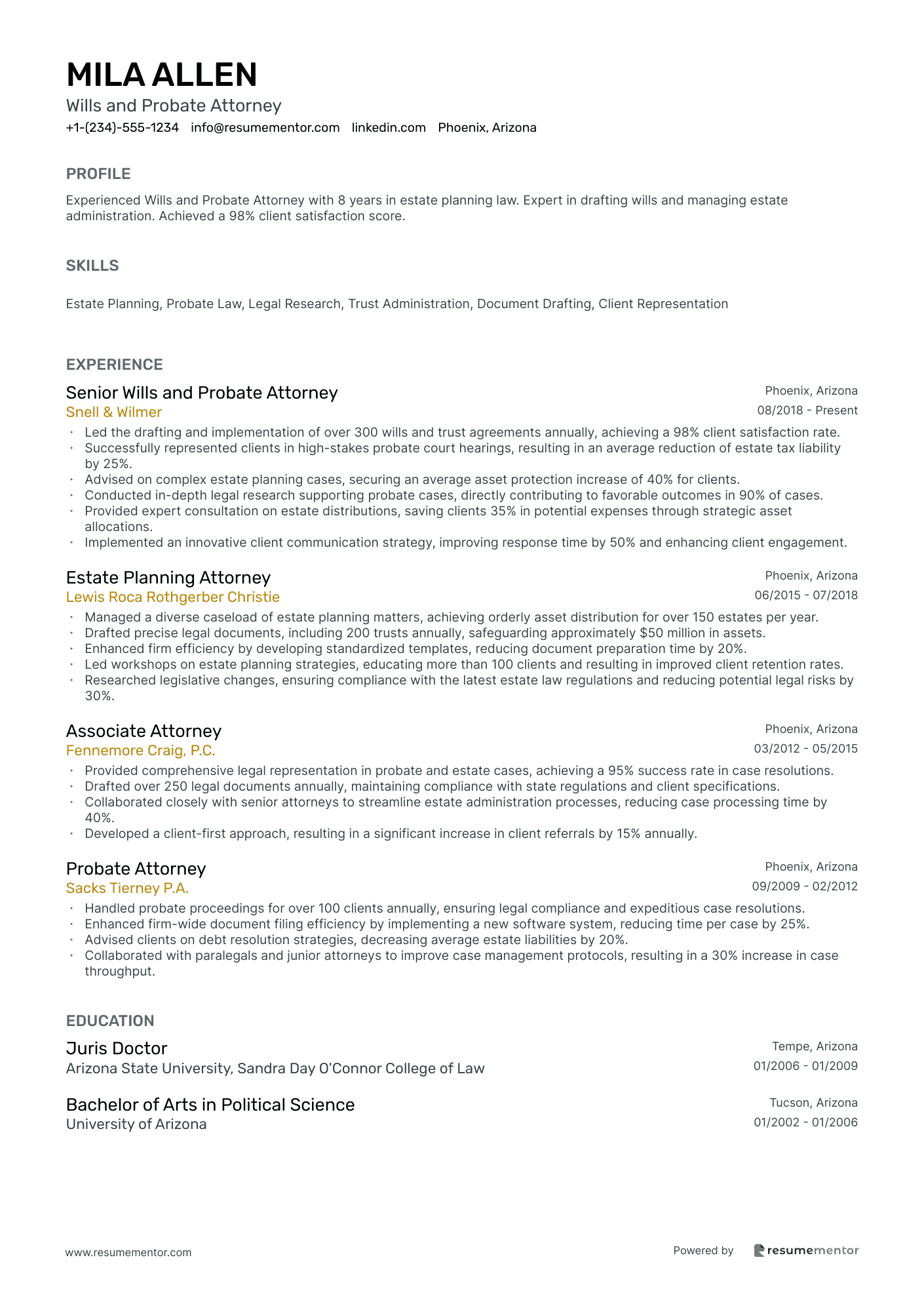
Wills and Probate Attorney
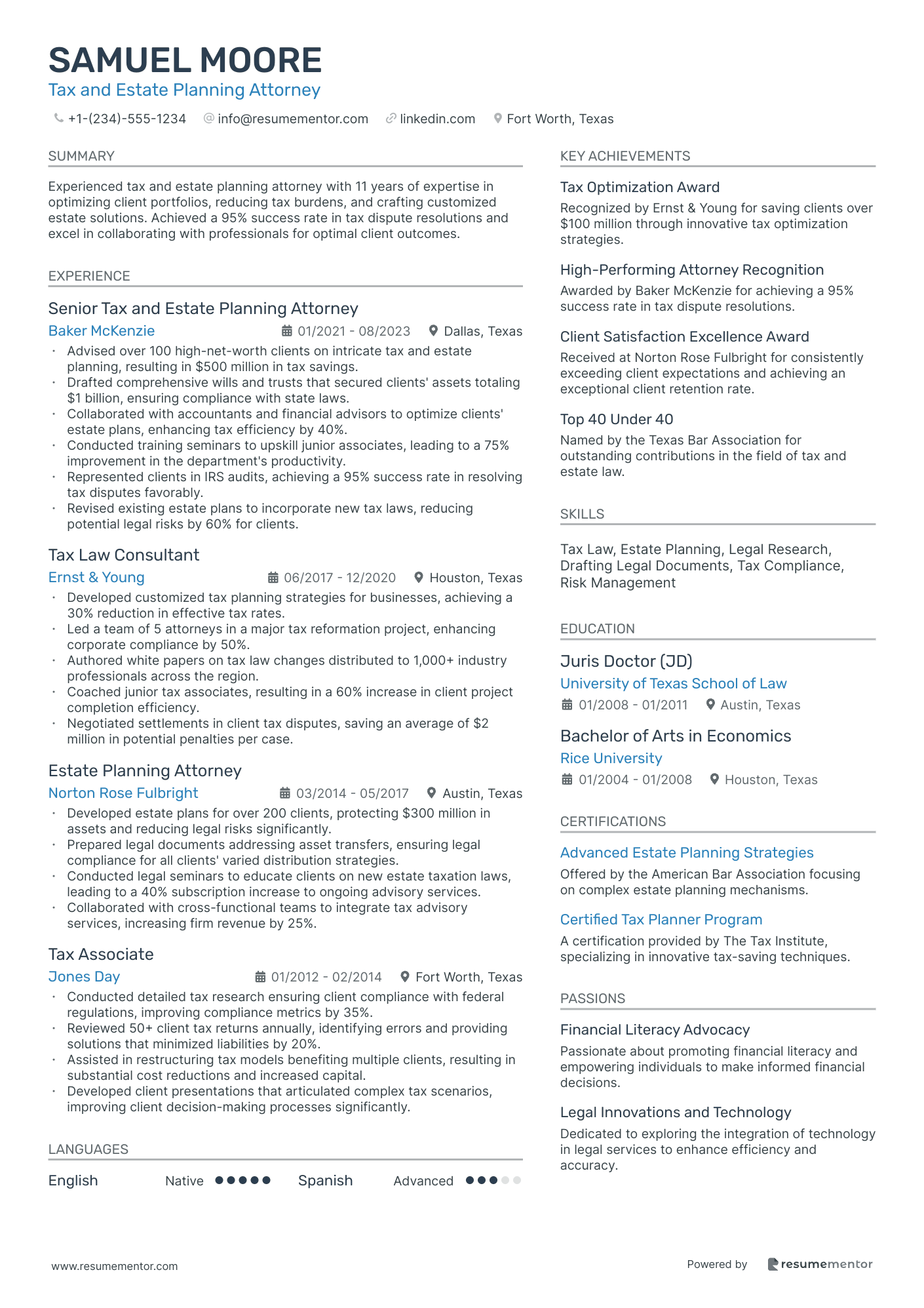
Tax and Estate Planning Attorney
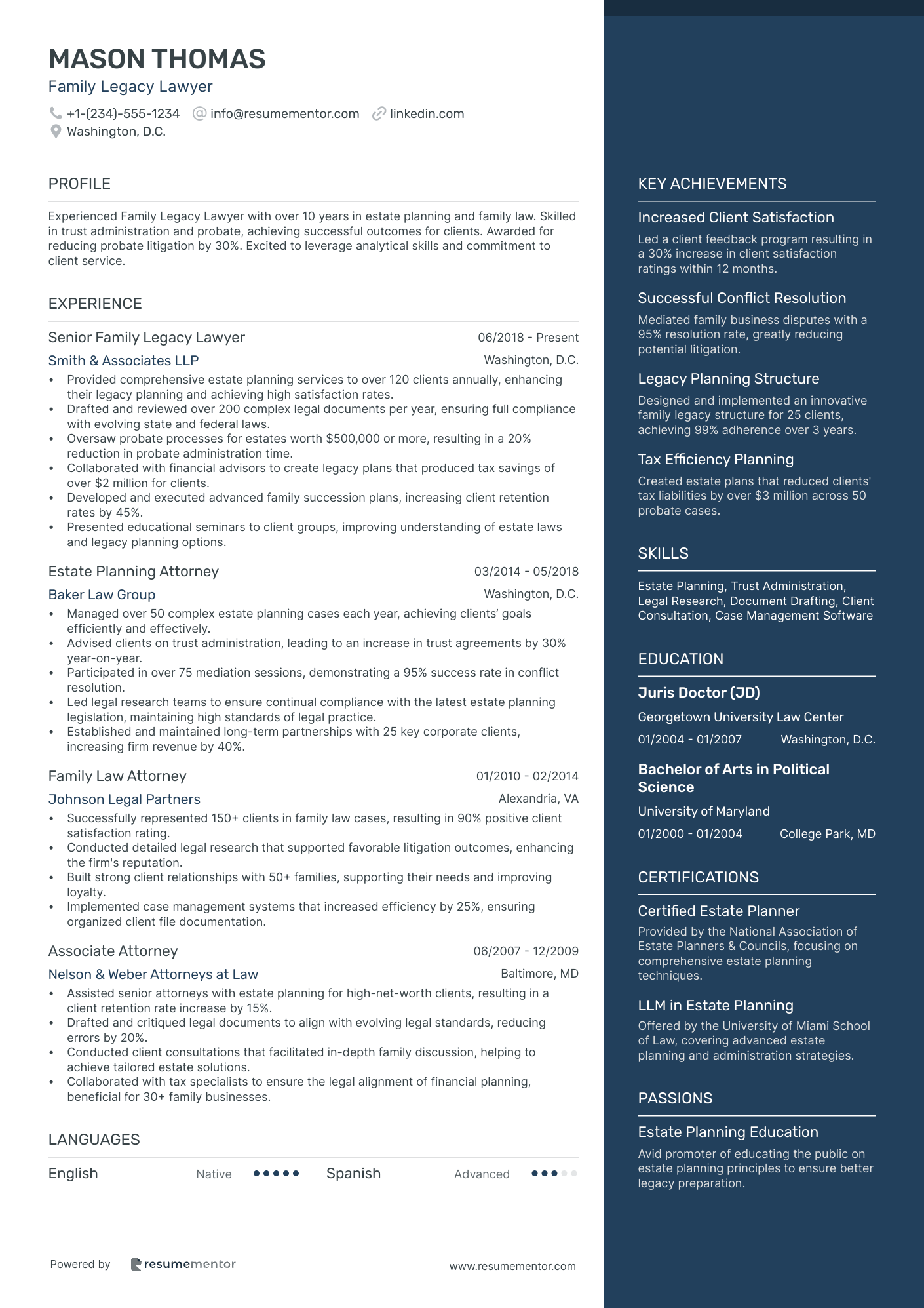
Family Legacy Lawyer
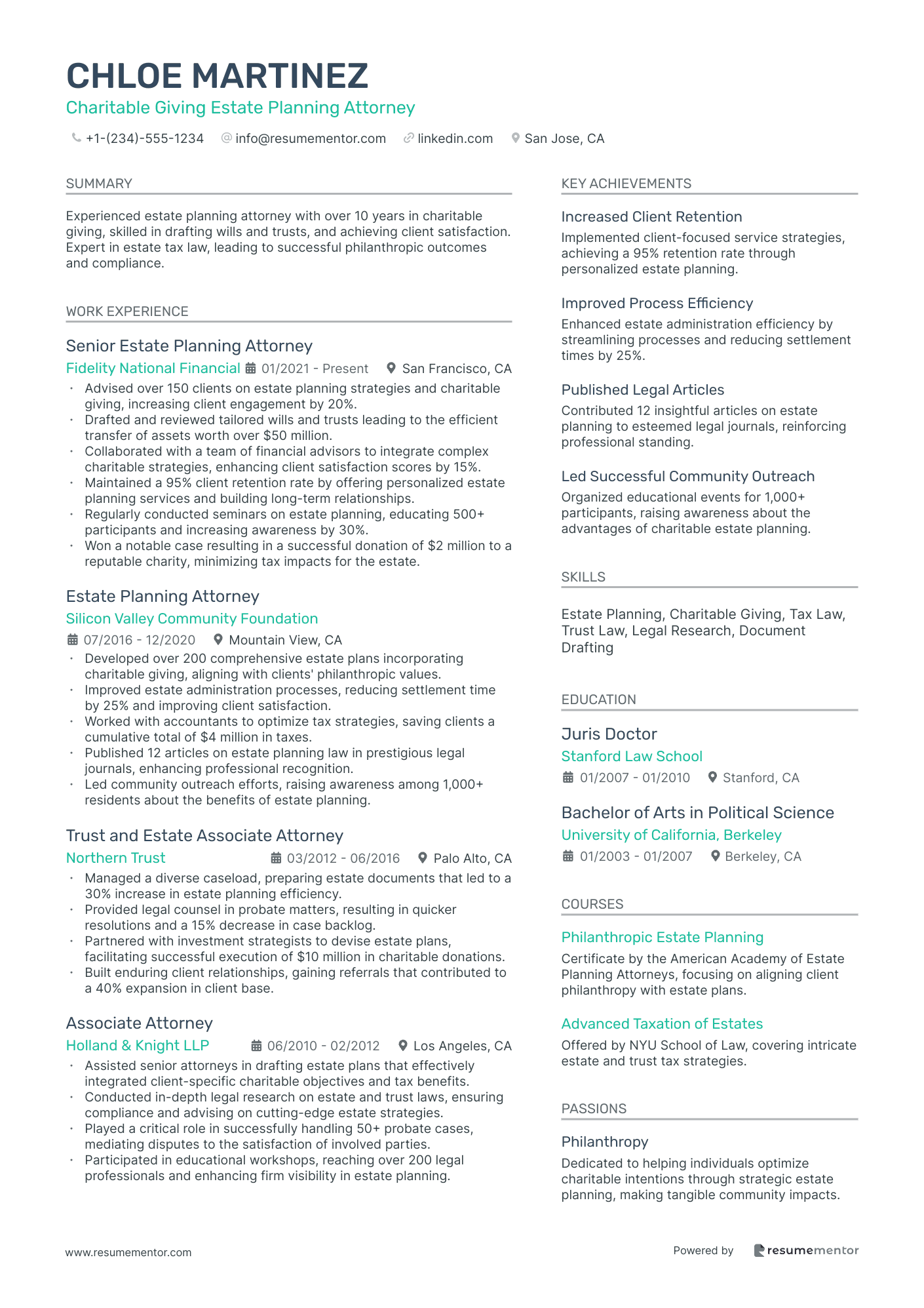
Charitable Giving Estate Planning Attorney
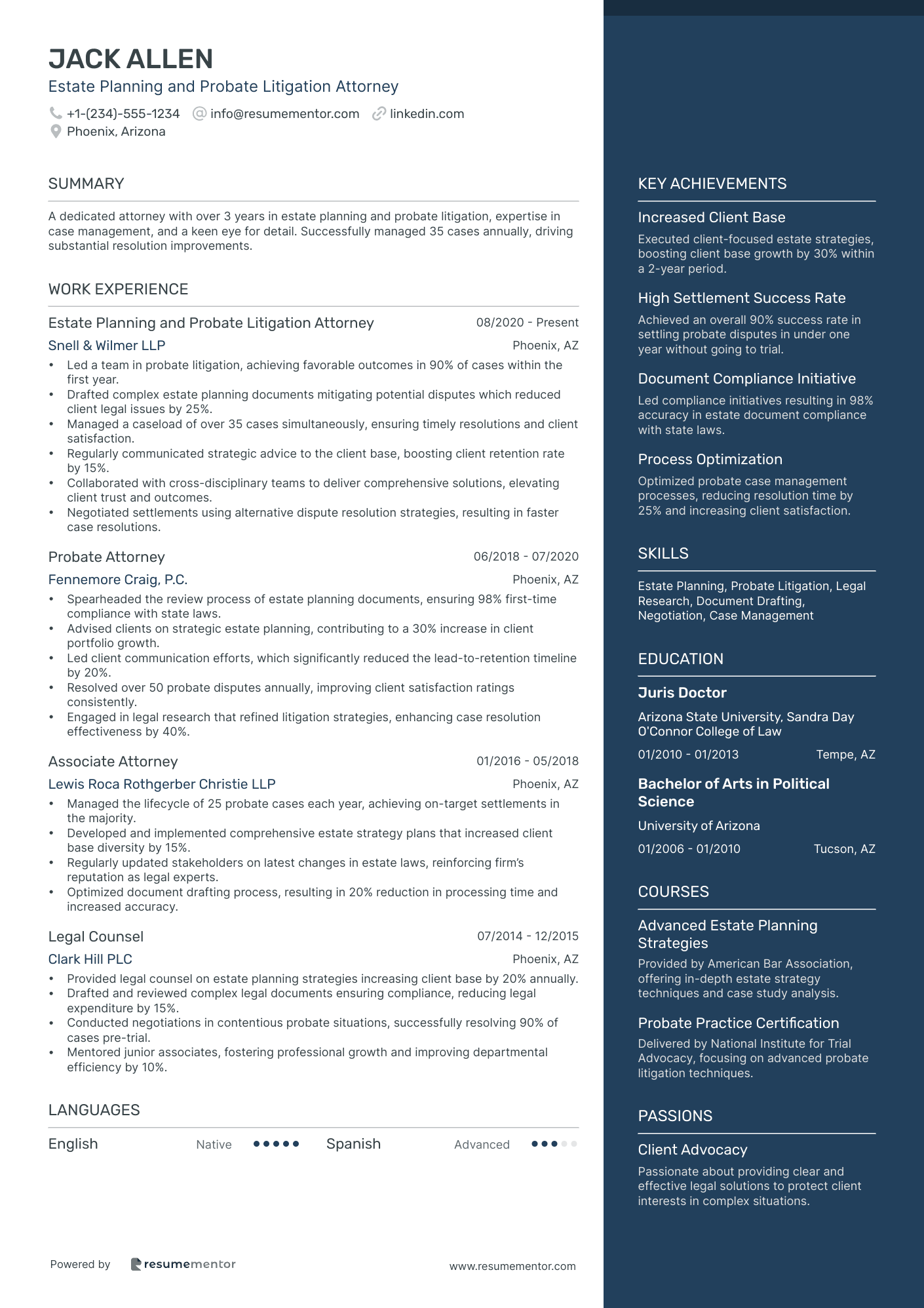
Estate Planning and Probate Litigation Attorney
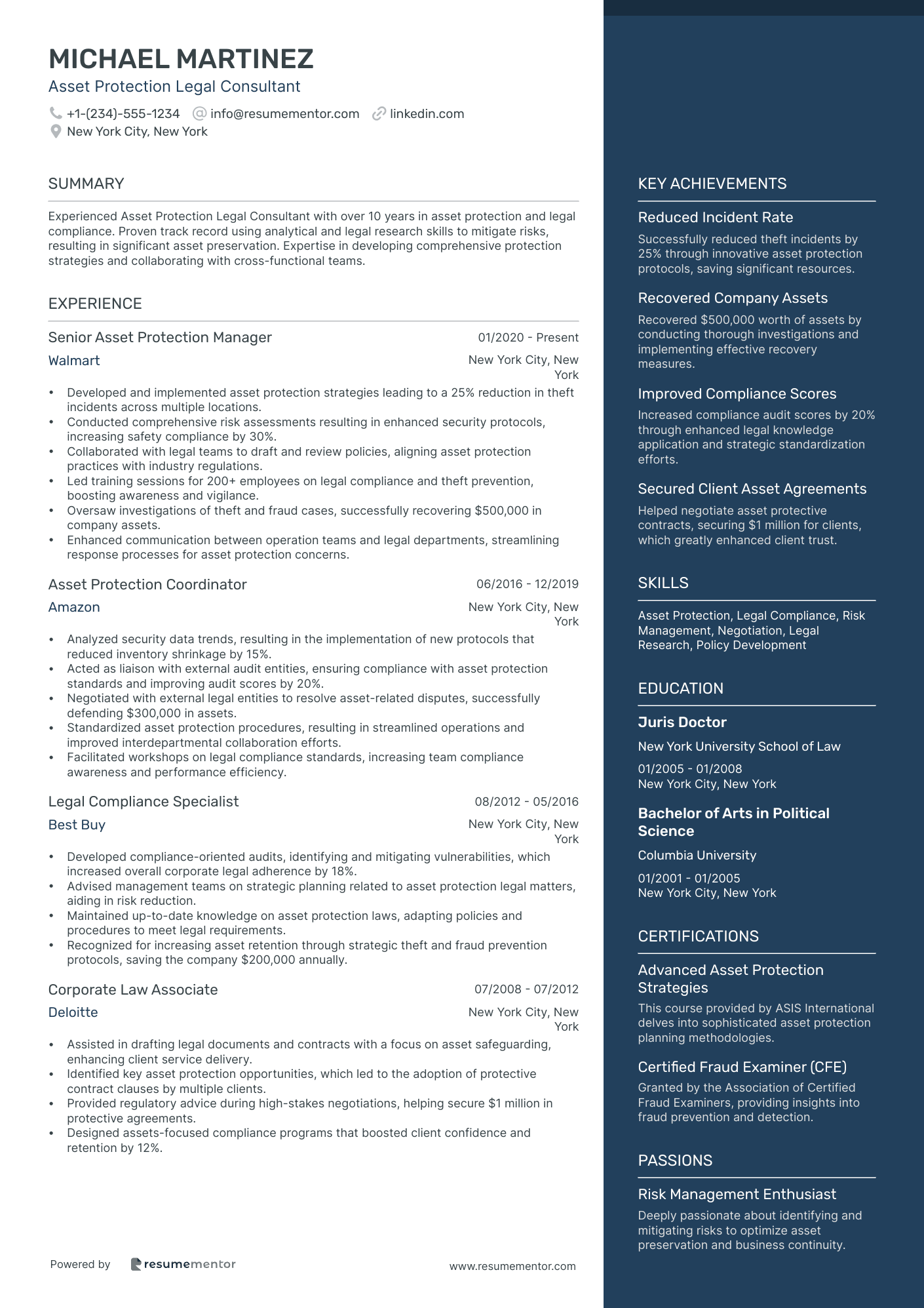
Asset Protection Legal Consultant
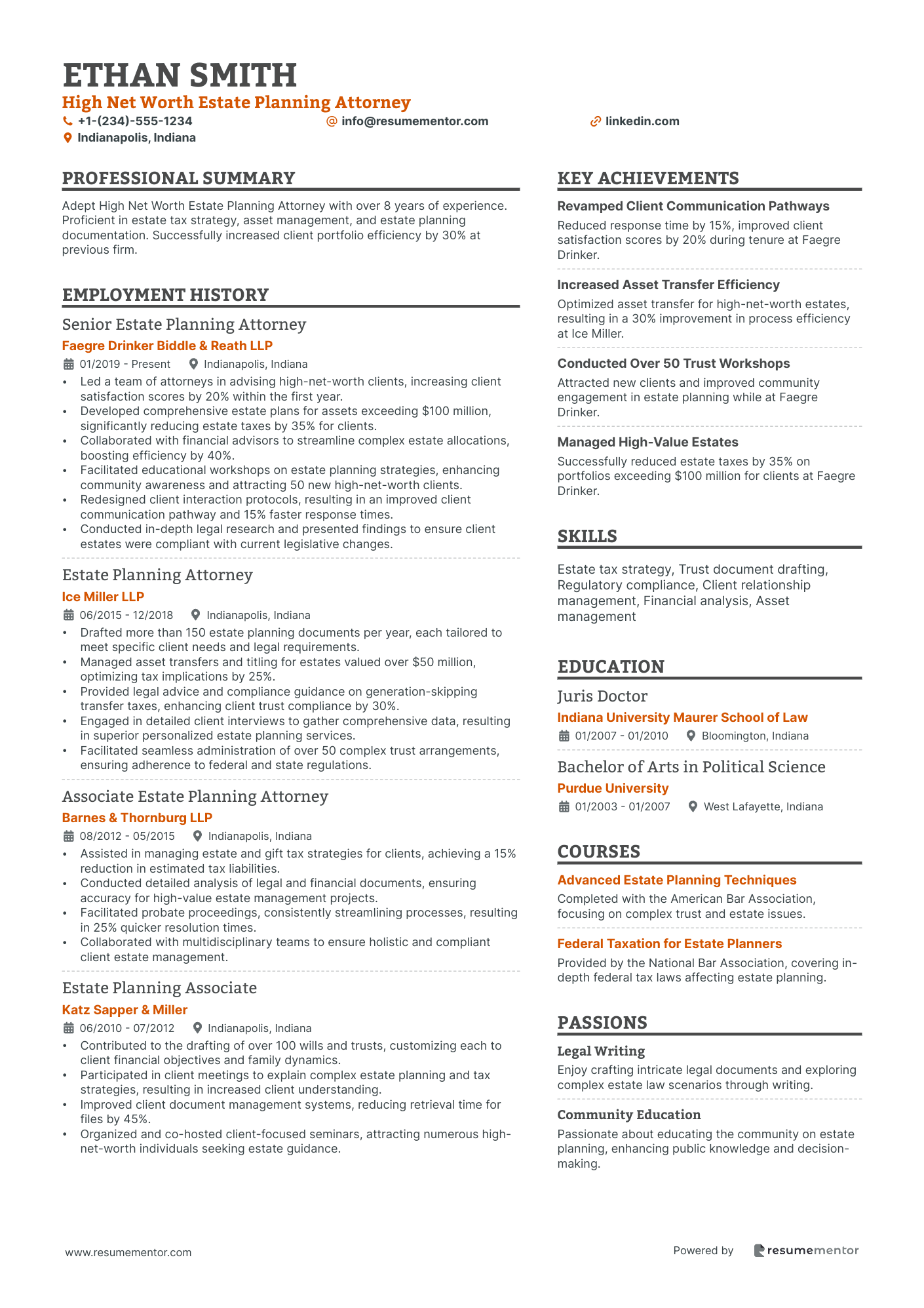
High Net Worth Estate Planning Attorney

Trust and Estates Attorney resume sample
- •Successfully managed estate plans for over 100 clients, implementing strategies that decreased tax liabilities by 20% on average.
- •Led probate administration for estates valued at $2 million+ each, ensuring efficient processes and high client satisfaction.
- •Drafted advanced estate planning documents tailoring asset protection, achieving compliance with federal laws.
- •Collaborated with a team of financial advisors and accountants to deliver comprehensive tax-efficient estate planning solutions.
- •Represented clients in trust disputes, securing favorable outcomes in 90% of cases.
- •Maintained up-to-date expertise in state and federal estate regulations, advising clients on compliant strategies.
- •Developed detailed estate plans that led to a 30% reduction in administrative costs for high-net-worth clients.
- •Provided legal counsel in probate court, resolving complex asset distribution cases with a 95% client approval rating.
- •Conducted estate and trust audits, ensuring compliance and preventing potential exposure to legal scrutiny.
- •Advised clients on intricate tax-related estate planning, facilitating long-term financial stability.
- •Built lasting client relations through personalized service, resulting in a 50% client referral increase.
- •Managed over 50 trust accounts, ensuring proper distribution of assets as per legal and client stipulations.
- •Streamlined trust administration processes, reducing procedural errors by 15% and enhancing service quality.
- •Enhanced client engagement by delivering regular updates and detailed reports on trust and estate matters.
- •Collaborated with legal and financial departments to implement comprehensive client trust management solutions.
- •Assisted in drafting essential estate planning documents for a diverse client base, leading to increased plan efficiency.
- •Researched and interpreted state and federal laws, providing well-informed advice to enhance client strategies.
- •Participated in client meetings to gather comprehensive information, resulting in tailored estate planning solutions.
- •Played a crucial role in resolving probate disputes, contributing to a 90% success rate for litigation cases.
Elder Law and Estate Planning Lawyer resume sample
- •Provided comprehensive legal counsel on estate and long-term care planning, including wills and trusts, helping 150 clients achieve asset protection.
- •Increased client base by 30% over two years through strategic networking and community outreach initiatives.
- •Led a team to draft legal documents, ensuring compliance with state regulations, which resulted in 0 client legal disputes.
- •Collaborated with healthcare providers to assist clients with Medicaid planning, resulting in 80% approval success rate for applications.
- •Conducted monthly seminars on elder law issues, educating over 500 community members annually and boosting firm visibility.
- •Maintained a client satisfaction rate of 95% by developing tailored strategies and addressing unique family dynamics.
- •Developed customized estate plans for clients, including trusts and advance directives, improving financial outcomes for over 100 families.
- •Advised clients on federal and state tax implications, streamlining tax liabilities by an average of $15,000 per client.
- •Researched and analyzed complex legal issues, providing actionable advice that reduced client legal risks by 25%.
- •Drafted and reviewed over 300 legal documents with a keen eye for detail, ensuring full compliance with evolving laws.
- •Fostered relationships with financial advisors and family members, resulting in 90% referral growth from satisfied clients.
- •Assisted clients in planning for long-term care requirements, increasing planning efficiency by 40% through automated tools.
- •Collaborated on guardianship cases, ensuring legal processes were completed efficiently, enhancing client outcome satisfaction by 50%.
- •Participated in 100+ mediation sessions, resulting in agreements that minimized litigation risks and expedited resolutions.
- •Gained proficiency in legal software, enhancing document management and reducing document processing times by 35%.
- •Created comprehensive estate plans for clients, offering solutions for asset transfer and tax reduction strategies.
- •Conducted in-depth analysis for Medicaid eligibility, achieving a 75% approval rate for complex cases.
- •Led client workshops to enhance understanding of legal rights, receiving positive feedback from over 200 attendees.
- •Worked closely with senior partners to develop firm-wide best practices, streamlining client intake processes by 20%.
Wills and Probate Attorney resume sample
- •Led the drafting and implementation of over 300 wills and trust agreements annually, achieving a 98% client satisfaction rate.
- •Successfully represented clients in high-stakes probate court hearings, resulting in an average reduction of estate tax liability by 25%.
- •Advised on complex estate planning cases, securing an average asset protection increase of 40% for clients.
- •Conducted in-depth legal research supporting probate cases, directly contributing to favorable outcomes in 90% of cases.
- •Provided expert consultation on estate distributions, saving clients 35% in potential expenses through strategic asset allocations.
- •Implemented an innovative client communication strategy, improving response time by 50% and enhancing client engagement.
- •Managed a diverse caseload of estate planning matters, achieving orderly asset distribution for over 150 estates per year.
- •Drafted precise legal documents, including 200 trusts annually, safeguarding approximately $50 million in assets.
- •Enhanced firm efficiency by developing standardized templates, reducing document preparation time by 20%.
- •Led workshops on estate planning strategies, educating more than 100 clients and resulting in improved client retention rates.
- •Researched legislative changes, ensuring compliance with the latest estate law regulations and reducing potential legal risks by 30%.
- •Provided comprehensive legal representation in probate and estate cases, achieving a 95% success rate in case resolutions.
- •Drafted over 250 legal documents annually, maintaining compliance with state regulations and client specifications.
- •Collaborated closely with senior attorneys to streamline estate administration processes, reducing case processing time by 40%.
- •Developed a client-first approach, resulting in a significant increase in client referrals by 15% annually.
- •Handled probate proceedings for over 100 clients annually, ensuring legal compliance and expeditious case resolutions.
- •Enhanced firm-wide document filing efficiency by implementing a new software system, reducing time per case by 25%.
- •Advised clients on debt resolution strategies, decreasing average estate liabilities by 20%.
- •Collaborated with paralegals and junior attorneys to improve case management protocols, resulting in a 30% increase in case throughput.
Tax and Estate Planning Attorney resume sample
- •Advised over 100 high-net-worth clients on intricate tax and estate planning, resulting in $500 million in tax savings.
- •Drafted comprehensive wills and trusts that secured clients' assets totaling $1 billion, ensuring compliance with state laws.
- •Collaborated with accountants and financial advisors to optimize clients' estate plans, enhancing tax efficiency by 40%.
- •Conducted training seminars to upskill junior associates, leading to a 75% improvement in the department's productivity.
- •Represented clients in IRS audits, achieving a 95% success rate in resolving tax disputes favorably.
- •Revised existing estate plans to incorporate new tax laws, reducing potential legal risks by 60% for clients.
- •Developed customized tax planning strategies for businesses, achieving a 30% reduction in effective tax rates.
- •Led a team of 5 attorneys in a major tax reformation project, enhancing corporate compliance by 50%.
- •Authored white papers on tax law changes distributed to 1,000+ industry professionals across the region.
- •Coached junior tax associates, resulting in a 60% increase in client project completion efficiency.
- •Negotiated settlements in client tax disputes, saving an average of $2 million in potential penalties per case.
- •Developed estate plans for over 200 clients, protecting $300 million in assets and reducing legal risks significantly.
- •Prepared legal documents addressing asset transfers, ensuring legal compliance for all clients' varied distribution strategies.
- •Conducted legal seminars to educate clients on new estate taxation laws, leading to a 40% subscription increase to ongoing advisory services.
- •Collaborated with cross-functional teams to integrate tax advisory services, increasing firm revenue by 25%.
- •Conducted detailed tax research ensuring client compliance with federal regulations, improving compliance metrics by 35%.
- •Reviewed 50+ client tax returns annually, identifying errors and providing solutions that minimized liabilities by 20%.
- •Assisted in restructuring tax models benefiting multiple clients, resulting in substantial cost reductions and increased capital.
- •Developed client presentations that articulated complex tax scenarios, improving client decision-making processes significantly.
Family Legacy Lawyer resume sample
- •Provided comprehensive estate planning services to over 120 clients annually, enhancing their legacy planning and achieving high satisfaction rates.
- •Drafted and reviewed over 200 complex legal documents per year, ensuring full compliance with evolving state and federal laws.
- •Oversaw probate processes for estates worth $500,000 or more, resulting in a 20% reduction in probate administration time.
- •Collaborated with financial advisors to create legacy plans that produced tax savings of over $2 million for clients.
- •Developed and executed advanced family succession plans, increasing client retention rates by 45%.
- •Presented educational seminars to client groups, improving understanding of estate laws and legacy planning options.
- •Managed over 50 complex estate planning cases each year, achieving clients’ goals efficiently and effectively.
- •Advised clients on trust administration, leading to an increase in trust agreements by 30% year-on-year.
- •Participated in over 75 mediation sessions, demonstrating a 95% success rate in conflict resolution.
- •Led legal research teams to ensure continual compliance with the latest estate planning legislation, maintaining high standards of legal practice.
- •Established and maintained long-term partnerships with 25 key corporate clients, increasing firm revenue by 40%.
- •Successfully represented 150+ clients in family law cases, resulting in 90% positive client satisfaction rating.
- •Conducted detailed legal research that supported favorable litigation outcomes, enhancing the firm's reputation.
- •Built strong client relationships with 50+ families, supporting their needs and improving loyalty.
- •Implemented case management systems that increased efficiency by 25%, ensuring organized client file documentation.
- •Assisted senior attorneys with estate planning for high-net-worth clients, resulting in a client retention rate increase by 15%.
- •Drafted and critiqued legal documents to align with evolving legal standards, reducing errors by 20%.
- •Conducted client consultations that facilitated in-depth family discussion, helping to achieve tailored estate solutions.
- •Collaborated with tax specialists to ensure the legal alignment of financial planning, beneficial for 30+ family businesses.
Charitable Giving Estate Planning Attorney resume sample
- •Advised over 150 clients on estate planning strategies and charitable giving, increasing client engagement by 20%.
- •Drafted and reviewed tailored wills and trusts leading to the efficient transfer of assets worth over $50 million.
- •Collaborated with a team of financial advisors to integrate complex charitable strategies, enhancing client satisfaction scores by 15%.
- •Maintained a 95% client retention rate by offering personalized estate planning services and building long-term relationships.
- •Regularly conducted seminars on estate planning, educating 500+ participants and increasing awareness by 30%.
- •Won a notable case resulting in a successful donation of $2 million to a reputable charity, minimizing tax impacts for the estate.
- •Developed over 200 comprehensive estate plans incorporating charitable giving, aligning with clients' philanthropic values.
- •Improved estate administration processes, reducing settlement time by 25% and improving client satisfaction.
- •Worked with accountants to optimize tax strategies, saving clients a cumulative total of $4 million in taxes.
- •Published 12 articles on estate planning law in prestigious legal journals, enhancing professional recognition.
- •Led community outreach efforts, raising awareness among 1,000+ residents about the benefits of estate planning.
- •Managed a diverse caseload, preparing estate documents that led to a 30% increase in estate planning efficiency.
- •Provided legal counsel in probate matters, resulting in quicker resolutions and a 15% decrease in case backlog.
- •Partnered with investment strategists to devise estate plans, facilitating successful execution of $10 million in charitable donations.
- •Built enduring client relationships, gaining referrals that contributed to a 40% expansion in client base.
- •Assisted senior attorneys in drafting estate plans that effectively integrated client-specific charitable objectives and tax benefits.
- •Conducted in-depth legal research on estate and trust laws, ensuring compliance and advising on cutting-edge estate strategies.
- •Played a critical role in successfully handling 50+ probate cases, mediating disputes to the satisfaction of involved parties.
- •Participated in educational workshops, reaching over 200 legal professionals and enhancing firm visibility in estate planning.
Estate Planning and Probate Litigation Attorney resume sample
- •Led a team in probate litigation, achieving favorable outcomes in 90% of cases within the first year.
- •Drafted complex estate planning documents mitigating potential disputes which reduced client legal issues by 25%.
- •Managed a caseload of over 35 cases simultaneously, ensuring timely resolutions and client satisfaction.
- •Regularly communicated strategic advice to the client base, boosting client retention rate by 15%.
- •Collaborated with cross-disciplinary teams to deliver comprehensive solutions, elevating client trust and outcomes.
- •Negotiated settlements using alternative dispute resolution strategies, resulting in faster case resolutions.
- •Spearheaded the review process of estate planning documents, ensuring 98% first-time compliance with state laws.
- •Advised clients on strategic estate planning, contributing to a 30% increase in client portfolio growth.
- •Led client communication efforts, which significantly reduced the lead-to-retention timeline by 20%.
- •Resolved over 50 probate disputes annually, improving client satisfaction ratings consistently.
- •Engaged in legal research that refined litigation strategies, enhancing case resolution effectiveness by 40%.
- •Managed the lifecycle of 25 probate cases each year, achieving on-target settlements in the majority.
- •Developed and implemented comprehensive estate strategy plans that increased client base diversity by 15%.
- •Regularly updated stakeholders on latest changes in estate laws, reinforcing firm’s reputation as legal experts.
- •Optimized document drafting process, resulting in 20% reduction in processing time and increased accuracy.
- •Provided legal counsel on estate planning strategies increasing client base by 20% annually.
- •Drafted and reviewed complex legal documents ensuring compliance, reducing legal expenditure by 15%.
- •Conducted negotiations in contentious probate situations, successfully resolving 90% of cases pre-trial.
- •Mentored junior associates, fostering professional growth and improving departmental efficiency by 10%.
Asset Protection Legal Consultant resume sample
- •Developed and implemented asset protection strategies leading to a 25% reduction in theft incidents across multiple locations.
- •Conducted comprehensive risk assessments resulting in enhanced security protocols, increasing safety compliance by 30%.
- •Collaborated with legal teams to draft and review policies, aligning asset protection practices with industry regulations.
- •Led training sessions for 200+ employees on legal compliance and theft prevention, boosting awareness and vigilance.
- •Oversaw investigations of theft and fraud cases, successfully recovering $500,000 in company assets.
- •Enhanced communication between operation teams and legal departments, streamlining response processes for asset protection concerns.
- •Analyzed security data trends, resulting in the implementation of new protocols that reduced inventory shrinkage by 15%.
- •Acted as liaison with external audit entities, ensuring compliance with asset protection standards and improving audit scores by 20%.
- •Negotiated with external legal entities to resolve asset-related disputes, successfully defending $300,000 in assets.
- •Standardized asset protection procedures, resulting in streamlined operations and improved interdepartmental collaboration efforts.
- •Facilitated workshops on legal compliance standards, increasing team compliance awareness and performance efficiency.
- •Developed compliance-oriented audits, identifying and mitigating vulnerabilities, which increased overall corporate legal adherence by 18%.
- •Advised management teams on strategic planning related to asset protection legal matters, aiding in risk reduction.
- •Maintained up-to-date knowledge on asset protection laws, adapting policies and procedures to meet legal requirements.
- •Recognized for increasing asset retention through strategic theft and fraud prevention protocols, saving the company $200,000 annually.
- •Assisted in drafting legal documents and contracts with a focus on asset safeguarding, enhancing client service delivery.
- •Identified key asset protection opportunities, which led to the adoption of protective contract clauses by multiple clients.
- •Provided regulatory advice during high-stakes negotiations, helping secure $1 million in protective agreements.
- •Designed assets-focused compliance programs that boosted client confidence and retention by 12%.
High Net Worth Estate Planning Attorney resume sample
- •Led a team of attorneys in advising high-net-worth clients, increasing client satisfaction scores by 20% within the first year.
- •Developed comprehensive estate plans for assets exceeding $100 million, significantly reducing estate taxes by 35% for clients.
- •Collaborated with financial advisors to streamline complex estate allocations, boosting efficiency by 40%.
- •Facilitated educational workshops on estate planning strategies, enhancing community awareness and attracting 50 new high-net-worth clients.
- •Redesigned client interaction protocols, resulting in an improved client communication pathway and 15% faster response times.
- •Conducted in-depth legal research and presented findings to ensure client estates were compliant with current legislative changes.
- •Drafted more than 150 estate planning documents per year, each tailored to meet specific client needs and legal requirements.
- •Managed asset transfers and titling for estates valued over $50 million, optimizing tax implications by 25%.
- •Provided legal advice and compliance guidance on generation-skipping transfer taxes, enhancing client trust compliance by 30%.
- •Engaged in detailed client interviews to gather comprehensive data, resulting in superior personalized estate planning services.
- •Facilitated seamless administration of over 50 complex trust arrangements, ensuring adherence to federal and state regulations.
- •Assisted in managing estate and gift tax strategies for clients, achieving a 15% reduction in estimated tax liabilities.
- •Conducted detailed analysis of legal and financial documents, ensuring accuracy for high-value estate management projects.
- •Facilitated probate proceedings, consistently streamlining processes, resulting in 25% quicker resolution times.
- •Collaborated with multidisciplinary teams to ensure holistic and compliant client estate management.
- •Contributed to the drafting of over 100 wills and trusts, customizing each to client financial objectives and family dynamics.
- •Participated in client meetings to explain complex estate planning and tax strategies, resulting in increased client understanding.
- •Improved client document management systems, reducing retrieval time for files by 45%.
- •Organized and co-hosted client-focused seminars, attracting numerous high-net-worth individuals seeking estate guidance.
Crafting a resume as an estate planning attorney is much like drafting a well-thought-out will, where every detail must align perfectly with your career goals. This document isn’t just a piece of paper; it serves as a gateway to new opportunities, yet articulating your expertise in a compelling way can often be challenging.
One of the main hurdles is balancing your legal language with an engaging narrative that remains clear to the reader. As someone skilled in drafting precise legal documents, your resume needs to reflect that same professionalism while captivating potential employers. Achieving this involves showcasing your specialized skills and accomplishments without overwhelming the reader with excessive detail.
A well-chosen resume template can provide the structure needed to organize your information effectively and keep your resume both clean and focused. This framework not only highlights your analytical acumen but also ensures that your attention to detail is evident throughout. For solid starting points to structure your resume, explore available resume templates that can streamline your efforts.
In essence, your resume is a thoughtful reflection of your expertise and strategic thinking. By using the right tools and approach, you’re more likely to leave a lasting impression. Dedicate time to refining your draft, ensuring every detail contributes to a cohesive narrative. This way, your resume will not just list your achievements; it will seamlessly tell the story of your professional journey.
Key Takeaways
- Crafting a resume as an estate planning attorney requires aligning every detail with your career goals and showcasing your legal expertise in a compelling, yet clear manner.
- Use a well-chosen resume template to organize information effectively, highlight your analytical skills, and ensure attention to detail.
- Focus on quantifiable achievements in your experience section to demonstrate the impact of your legal work and expertise convincingly.
- Select a chronological resume format to clearly trace your career trajectory and use modern fonts to maintain a professional and contemporary look.
- Incorporate key skills like estate planning, trust administration, tax law, and empathy, ensuring they align with job descriptions and enhance compatibility with applicant tracking systems.
What to focus on when writing your estate planning attorney resume
Your estate planning attorney resume should effectively showcase your legal expertise along with your commitment to client-focused service. It needs to clearly convey your ability to manage estate planning needs with a blend of knowledge and compassion. Highlighting your proficiency in wills, trusts, tax law, and building strong client relationships sets you apart. To create a compelling resume, consider including the following sections:
How to structure your estate planning attorney resume
- Contact Information: Make it easy for recruiters to reach you by listing your name, phone number, email, and LinkedIn profile—ensuring this section is accurate and up-to-date is crucial to facilitate smooth communication and demonstrate your professionalism. This foundational element sets the stage for more detailed descriptions that follow.
- Professional Summary: Provide a concise overview of your estate planning expertise, focusing on your ability to craft comprehensive estate plans and navigate complex legal landscapes—using action-oriented language in this section can effectively capture your career trajectory and set a promising tone for your resume. This summary acts as an enticing preview of your abilities that the recruiter will delve into next.
- Legal Experience: In your previous roles, emphasize your estate planning responsibilities, such as drafting estate documents and guiding clients through probate cases. This will demonstrate your practical experience—detailing specific accomplishments within these tasks can further showcase the impact you've had in previous positions, creating a narrative of professional growth. This segment naturally leads to an exploration of your educational background and credentials.
- Education and Licenses: Highlight your law degree and any relevant certifications to underscore your qualifications and authority to practice in your jurisdiction—presenting this information with attention to notable achievements such as academic honors can enhance the perceived value of your educational history. This foundation supports the specialized skills and affiliations you'll highlight in upcoming sections.
- Key Skills: Emphasize specialized skills like trust administration, elder law knowledge, and tax planning. These skills illustrate your readiness for roles centered on estate management—articulating these capabilities clearly and relating them to real-world applications can reinforce your suitability for the position. This area naturally transitions into demonstrating your professional involvement and affiliations.
- Professional Affiliations: Show your engagement in the professional community by listing memberships in bar associations or estate planning councils, which enhance your credibility—by including any leadership roles or notable contributions within these organizations, you further solidify your dedication to and influence within the industry. The following discussion will offer more in-depth insight into crafting each section effectively.
Which resume format to choose
As an estate planning attorney, crafting a professional resume starts with selecting the right format. A chronological format is ideal as it showcases your extensive experience in a straightforward manner, allowing potential employers to easily trace your career trajectory and skills. The choice of font also plays a significant role in creating a strong impression. Opt for modern fonts like Raleway, Montserrat, or Lato, which keep your resume clean and contemporary without overwhelming the reader. These choices make your document feel fresh and relevant, avoiding the outdated look that can come with fonts like Arial or Times New Roman.
To ensure your resume maintains its polished appearance on any device, always save it as a PDF. This file type preserves your formatting, ensuring that your document looks professional no matter where it’s viewed. Consistency in layout is crucial for communicating reliability and attention to detail, both vital traits in the legal field. Additionally, using one-inch margins on all sides keeps your document neat and balanced, making it easy to read and scan quickly, an important factor for busy recruiters. By carefully considering these elements, you create a resume that effectively highlights your strengths and positions you well in the competitive field of estate planning.
How to write a quantifiable resume experience section
A compelling resume experience section for an estate planning attorney seamlessly showcases your skills, contributions, and the impact you've had in your roles. Start by focusing on your expertise in estate planning, client relations, and legal outcomes. Structure this section chronologically, beginning with your most recent position, as this helps prove your qualifications and convince a hiring manager that you're the right fit. Include relevant job titles and consider summarizing older roles if they aren't directly related to estate planning. Tailoring your resume to align with the job ad is key, focusing on the specific skills and experiences they seek and demonstrating them through action words like "advised," "drafted," "negotiated," and "implemented."
Concentrate on the past 10-15 years of your career, with an emphasis on recent roles to highlight your current skills. Prioritize the positions that directly relate to estate planning and feature quantifiable impacts, like the number of clients advised or documents drafted. Tailoring your resume ensures that your experience aligns with the job's requirements, making it clear that you are a perfect match. Each bullet point should highlight achievements directly related to the role, illustrating your ability to meet the job's demands.
- •Advised over 200 clients annually on estate planning strategies, achieving a 95% satisfaction rate.
- •Drafted and executed 300+ wills and trust documents, ensuring a seamless transfer of wealth worth over $50 million.
- •Implemented a new client management system, cutting document processing time by 30%.
- •Led workshops on estate tax planning, boosting firm revenue by 15% year-over-year.
This experience section effectively highlights your impact and expertise as an estate planning attorney. By emphasizing quantifiable achievements such as advising clients and increasing firm revenue, you illustrate the value you bring to potential employers. Each bullet point prioritizes accomplishments over tasks, focusing on results that potential employers want. The use of clear, action-based language not only communicates your expertise but also strengthens your professional narrative. With a clear chronological order and concrete data, the narrative demonstrates a consistent track record of success, making your resume stand out.
Responsibility-Focused resume experience section
A responsibility-focused estate planning attorney resume experience section should clearly demonstrate how your actions have positively impacted your clients and your firm. Begin by identifying the core duties that highlight your ability to manage and improve estate planning processes. Illustrate how you’ve effectively reduced taxes and protected assets, showing the tangible benefits these efforts brought to clients. Include any significant projects or initiatives you led that drove change or resulted in meaningful outcomes, emphasizing your capacity for leadership.
Break down your accomplishments into bullet points, focusing on where you've shown strong problem-solving skills and built relationships with clients. Highlight collaborations with financial advisors that enhanced estate strategies, which not only underscores your teamwork skills but also your dedication to tailored client solutions. Ensure the entire section is aligned with the skills and experiences relevant to the job you’re applying for, crafting a narrative that resonates with potential employers.
Estate Planning Attorney
Smith & Johnson Law Firm
2018-2023
- Managed over 200 client cases, successfully reducing estate taxes while protecting assets.
- Developed comprehensive estate plans that saved clients an average of 15% in probate costs.
- Coordinated with financial advisors to create tailored estate strategies.
- Conducted in-depth client consultations, ensuring clear understanding of estate laws and options.
Technology-Focused resume experience section
A technology-focused estate planning attorney resume experience section should effectively highlight your ability to integrate legal tech tools into your practice. Start by detailing the technology-driven tasks you've mastered and how they have become an integral part of your legal processes. This approach helps demonstrate how technology has improved efficiency, enhanced client communication, or streamlined document management in your work. By presenting yourself as a legal professional who embraces innovative tech, you invite hiring managers to see how your skills can benefit their firm.
When crafting bullet points, emphasize achievements with measurable outcomes, focusing on your experience with estate planning software. Demonstrate how you’ve accelerated document preparation times or ensured secure digital management of client information. Each point should show the positive impacts on client results and overall firm productivity. An effectively crafted experience section will illustrate how you've used technology to elevate estate planning and legal services.
Senior Estate Planning Attorney
Future Legal Innovations LLC
June 2020 - Present
- Integrated advanced document automation software, reducing preparation time for estate documents by 40%.
- Developed digital client onboarding processes, improving client engagement and reducing data entry errors by 25%.
- Implemented secure cloud-based storage for client files, enhancing access and collaboration with a team of paralegals.
- Utilized AI-driven legal research tools to provide faster estate planning solutions, reducing research time by 15%.
Innovation-Focused resume experience section
An innovation-focused estate planning attorney resume experience section should highlight your ability to introduce new practices, technologies, or processes that bring significant value to your firm. Begin by showcasing achievements that emphasize your creative problem-solving skills and how you've tackled complex legal issues in novel ways. It's important to describe how these innovations not only improved efficiency but also enhanced client satisfaction, resulting in positive outcomes for your workplace. Specific bullet points should clearly demonstrate your role in implementing these changes and the tangible benefits they brought.
Each entry should start with a compelling action verb that captures your innovative strategies and their successful results. Offer context by outlining the challenges encountered and how your novel approach effectively addressed them. Use measurable outcomes to illustrate your impact—describing how you've streamlined processes or improved client communication through technology. For example, explain how a new digital tool improved client interactions or how an innovative system significantly reduced paperwork errors.
Estate Planning Attorney
Smith & Associates Law Firm
2020-2023
- Developed a digital platform for clients to securely access estate planning documents, increasing client satisfaction by 25%.
- Introduced an automated document drafting system, reducing preparation time by 40% and cutting down errors.
- Implemented a client relationship management system to track interactions, boosting engagement by 30%.
- Led a project to create interactive online workshops for estate planning, achieving a 50% rise in client participation.
Customer-Focused resume experience section
A customer-focused estate planning attorney resume experience section should emphasize how your skills directly benefit clients. Start by showcasing your ability to explain legal complexities in simple terms while demonstrating empathy and understanding throughout the process. This leads to building strong client relationships, which you can further highlight by providing examples of tailored legal solutions that meet individual needs. When you mention your success in creating positive client outcomes, connect it to specific cases where your attention to detail and dedication played a crucial role.
Using action verbs at the beginning of each bullet point helps illustrate your proactive approach to client representation. Show diverse examples from your work history that demonstrate your problem-solving skills and ability to handle multiple cases efficiently. Keep your language varied yet consistent, maintaining a professional tone focused on clients’ needs. This approach helps potential employers see you as a lawyer who not only understands the law but also genuinely dedicates themselves to advocating for and improving clients' experiences.
Estate Planning Attorney
Smith & Associates Law Firm
January 2018 - Present
- Guided over 150 families through the estate planning process, ensuring clear understanding and satisfaction.
- Developed custom estate plans that protected client interests and minimized legal risks.
- Enhanced client retention by establishing trust through transparent and empathetic communication.
- Improved client outcomes by closely collaborating with financial advisors and accountants.
Write your estate planning attorney resume summary section
An estate planning-focused attorney resume summary should clearly convey your experience and achievements in the field. By highlighting your skills in drafting wills, creating trusts, and managing estate plans, you demonstrate your expertise. Consider this example for your resume:
This summary effectively conveys your capabilities by emphasizing essential skills like drafting wills and managing probate cases, supported by over a decade of experience. By showcasing achievements, such as handling complex cases, you reinforce your status as a seasoned professional. When crafting your summary, focus on the qualities that set you apart as an attorney.
Understanding the difference between a summary and other resume components helps clarify your professional narrative. A summary outlines your career highlights and accomplishments, whereas a resume objective states your future goals. Objectives work best for those starting out or changing fields, while summaries suit experienced professionals. A resume profile is similar to a summary but is more personal and concise. Meanwhile, a summary of qualifications lists specific skills and achievements. Tailoring your section to reflect your strengths and career stage ensures it effectively communicates your professional story.
Listing your estate planning attorney skills on your resume
A skills-focused estate planning attorney resume should emphasize your capabilities in both technical and interpersonal areas. The skills section is crucial—it can stand as an independent part or be woven into your experience and summary. Highlighting your strengths and soft skills, like communication and empathy, along with concrete hard skills, such as understanding tax laws and drafting legal documents, is essential.
Integrating these skills as keywords throughout your resume not only captures the attention of recruiters but also ensures compatibility with applicant tracking systems. Aligning your skills with the job description emphasizes your core competencies and boosts your visibility.
Consider structuring your skills section like this:
This concise format is effective because it highlights eight crucial skills, demonstrating your focused expertise and aligning with employer expectations.
Best hard skills to feature on your estate planning attorney resume
The hard skills section on your resume reflects your specialized abilities in legal matters. These abilities demonstrate proficiency in handling laws, regulations, and procedures essential for estate planning.
Hard Skills
- Estate Planning
- Wills and Trusts Drafting
- Tax Law Proficiency
- Probate Law Knowledge
- Legal Document Drafting
- Client and Estate Analysis
- Asset Protection Strategies
- Wealth Management
- Property Law Knowledge
- Guardianship Laws
- Risk Assessment
- Business Succession Planning
- Real Estate Transactions
- Retirement Planning
- Financial Advising
Best soft skills to feature on your estate planning attorney resume
Soft skills are also key, highlighting your interpersonal abilities that are crucial for client and team interactions. Effective communication, empathy, and leadership should be clearly communicated.
Soft Skills
- Communication
- Empathy
- Problem Solving
- Organization
- Attention to Detail
- Critical Thinking
- Time Management
- Client Relationship Management
- Conflict Resolution
- Negotiation
- Patience
- Adaptability
- Ethical Judgment
- Leadership
- Teamwork
How to include your education on your resume
The education section is a key part of your estate planning attorney resume. It shows your qualifications and readiness for the role. Tailor your education section to the job by including only relevant education. If it doesn't relate to the job, leave it out. When listing your degree, use the full degree name such as "Juris Doctor" instead of abbreviations. Including your GPA is optional unless it highlights your excellence, such as a high score (above 3.5). If you graduated with honors, specify it by indicating "cum laude," "magna cum laude," or "summa cum laude" as applicable.
Here is a wrong example:
- •Studied various authors.
This example is not suited for an estate planning attorney because the degree is unrelated to law.
Here is a right example:
This example is strong because it directly relates to an estate planning attorney role. Listing a "Juris Doctor" from a reputable institution with a high GPA shows dedication. The absence of unnecessary details keeps the focus on what's important.
How to include estate planning attorney certificates on your resume
Including a certificates section in your estate planning attorney resume is crucial as it showcases your expertise and continued professional development. List the name of each certificate clearly. Include the date when you earned each certification. Add the issuing organization for each credential to establish its credibility. You can also put certificates in the header for quick visibility.
For example:
A good example shows certifications directly relevant to estate planning, like "Certified Estate and Trust Specialist" from the National Association of Estate Planners & Councils. It also includes a "Certified Elder Law Attorney" certification from the National Elder Law Foundation. This example is effective because it highlights relevant certifications and adds credibility by showing the issuing organizations. This approach ensures your qualifications are immediately noticeable and relevant to the role.
Extra sections to include in your estate planning attorney resume
Creating a resume for an estate planning attorney involves highlighting skills, experiences, and attributes that showcase expertise and dedication to legal services. Including diverse sections can create a comprehensive picture of your qualifications and character.
- Language section — Highlight proficiency in multiple languages to demonstrate versatility in client communications and increase business opportunities. Include fluency levels and any certifications obtained for validity.
- Hobbies and interests section — Reveal personal activities to display a well-rounded personality and potentially connect on a personal level with clients. Mention hobbies that subtly enhance relevant skills like analytical thinking or attention to detail.
- Volunteer work section — Show community engagement and dedication to pro bono work to reflect a sense of responsibility and empathy. Include specific roles and achievements in legal volunteer projects to emphasize your commitment.
- Books section — List legal publications or influential books read to demonstrate ongoing education and passion for the field. Mention any contributions to legal literature to establish authority and thought leadership in estate planning law.
In Conclusion
In conclusion, crafting a strong resume as an estate planning attorney involves more than listing your credentials—it requires weaving a narrative that accurately highlights your skills and achievements. A well-structured resume not only reflects your legal expertise but also your strategic thinking and ability to solve complex problems for clients. It should showcase your specialized skills in estate planning while aligning with prospective employers' expectations. Selecting a clean and modern format ensures your resume is both professional and accessible, leaving a positive first impression. By focusing on quantifiable achievements in areas such as client satisfaction and technological integration, you demonstrate your value to potential employers. Including relevant certifications and highlighting a commitment to continuous learning further positions you as a skilled and dedicated legal professional. Remember, your resume acts as a powerful tool in telling your career story, so take the time to tailor it to the specific job you seek. This approach will help you stand out in the competitive field of estate planning, opening doors to new opportunities and advancing your legal career.
Related Articles

Continue Reading
Check more recommended readings to get the job of your dreams.
Resume
Resources
Tools
© 2026. All rights reserved.
Made with love by people who care.

